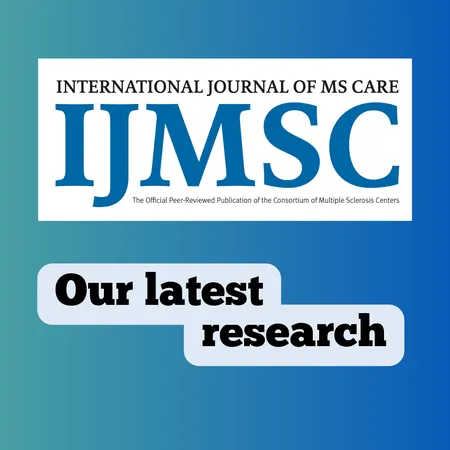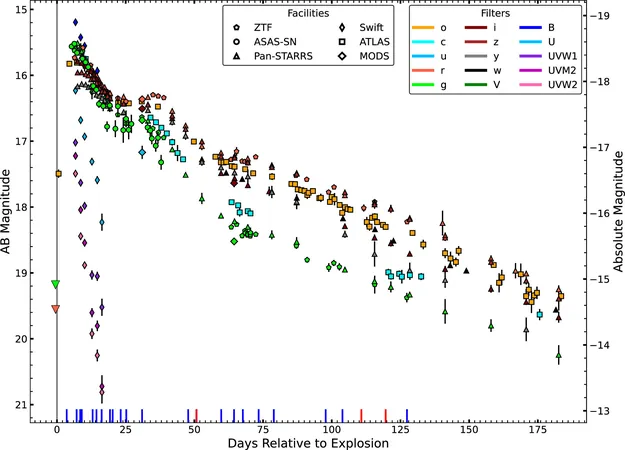
Groundbreaking Findings in Multiple Sclerosis Research Unveiled by IJMSC
2024-12-02
Author: Benjamin
Introduction
The latest research published in the International Journal of MS Care sheds light on several critical aspects of managing multiple sclerosis (MS). This November/December edition focuses on the multifaceted nature of falls among individuals with MS, revealing vital insights that could transform patient care.
Complex Nature of Falls
Research shows that falls are more complex than previously understood, influenced by a variety of direct, indirect, and circumstantial factors. It appears that prior activities—such as physical exertion or prior illnesses—can critically lower the ability to maintain balance, indicating that tailored fall-prevention strategies are essential. The study emphasizes the necessity for environmental modifications, coping strategies, and proactive measures, especially since falls often occur during outdoor activities or routine life tasks. Interestingly, it suggests that including personal factors like emotional health and self-confidence during clinical consultations can enhance patient awareness and considerably diminish fall risks.
Frailty in Older Adults with MS
Moreover, the study highlights concerning data regarding frailty in older adults with MS. Results indicate that over half (57.7%) of this population samples show signs of frailty, impacting cognitive performance. The research points out that, while cognitive issues exist across all older populations, the degree of frailty in MS patients can be addressed through comprehensive interventions that emphasize physical activity, suggesting improvements in both physical capabilities and cognitive function.
Cognitive Assessments
Cognitive assessments reveal that both objective processing speed and subjective cognitive perceptions significantly affect how MS patients experience life disruptions caused by their illness. A striking correlation was noted between slower processing speed—measured through the Symbol Digit Modalities Test—and greater illness intrusiveness, confirming the need for healthcare professionals to consider patients’ self-reported cognitive experiences when building treatment strategies. Remarkably, resilience appears to mitigate the intrusiveness of cognitive decline, proposing a potential focus for therapeutic interventions.
Fingolimod Treatment and Relapse Rates
Lastly, the research raises red flags regarding the abrupt stop of fingolimod treatment. The findings demonstrate a staggering 81% increase in relapse rates following sudden discontinuation, along with more severe relapses and delayed recovery times. Fingolimod withdrawal is linked to disturbances in immune balance due to the release of autoreactive T cells and inflammatory mediators, suggesting a rebound effect. Notably, MRI scans revealed new lesions in 19% of patients post-withdrawal, though the study found no significant differences in outcomes related to whether medication was halted abruptly or gradually. Further analysis identified that high baseline annualized relapse rates, previous disease breakthroughs while on fingolimod, female sex, and low lymphocyte counts at the point of cessation, all posed significant risk factors for relapse.
Conclusion
This emerging body of research emphasizes the urgent need for personalized care strategies in MS management, calling on healthcare providers to integrate these findings into practice to improve the quality of life for individuals battling this challenging disease.









 Brasil (PT)
Brasil (PT)
 Canada (EN)
Canada (EN)
 Chile (ES)
Chile (ES)
 España (ES)
España (ES)
 France (FR)
France (FR)
 Hong Kong (EN)
Hong Kong (EN)
 Italia (IT)
Italia (IT)
 日本 (JA)
日本 (JA)
 Magyarország (HU)
Magyarország (HU)
 Norge (NO)
Norge (NO)
 Polska (PL)
Polska (PL)
 Schweiz (DE)
Schweiz (DE)
 Singapore (EN)
Singapore (EN)
 Sverige (SV)
Sverige (SV)
 Suomi (FI)
Suomi (FI)
 Türkiye (TR)
Türkiye (TR)